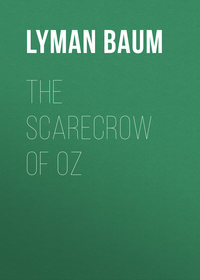 полная версия
полная версияAnnabel
“How did you come to own this process, anyway? Why does it not belong to the heirs of the man who discovered it?”
Mr. Jordan poised his gaunt form more erectly than ever, and his glittering spectacles were directed full upon the other’s face.
“I believe I have already explained that. John Carden transferred to me his right to the discovery in consideration of money which he owed me and could not pay.”
“You loaned him money?”
“Yes.”
“Where did you get it?”
“Sir, that is not your affair.”
“You never earned a dollar more than a bare living until I began to pay you royalties on the process. On the other hand, I have evidence that Carden loaned you money.”
The man shrank back.
“You are becoming offensive, Mr. Williams, in your remarks, and I beg to remind you we are not alone,” he said, not without dignity.
“I am interested in this matter myself, sir,” said Dr. Meigs, now speaking for the first time. “You know that I am a friend of the Carden family, even as I have always been your friend, Mr. Jordan. Therefore it would please me to be able to disentangle this mystery and have all doubts removed from my mind. You have told me, as you have told Mr. Williams, that John Carden owed you ten thousand dollars when he went away. Naturally we are curious to know how so great a sum came into the possession of a poor bank clerk, such as you then were. And also I have wondered what John Carden ever did with that money.”
Again the secretary wiped his brow, but, ignoring for the present Mr. Williams, he turned toward the doctor to reply.
“You have no right to ask me such questions, Doctor Meigs; but it may be that from your standpoint there is some justice in your suspicions. I am, therefore, quite willing to answer you. John Carden spent all his own money, and afterward mine, in expensive experiments. The money I obtained by a lucky speculation in a lottery, the ticket for which I bought under an assumed name, as I did many other tickets, when I was a poor clerk and had no hopes of otherwise acquiring wealth. It is very natural I should hesitate to declare myself a gambler, by explaining this openly; but never since that time have I invested one cent in speculation of any sort. And now, as I have duties to attend to, I will bid you good afternoon, believing that you will respect my confidence.”
As he concluded, the secretary, who never within the knowledge of man had uttered so lengthy a speech before, bowed gravely and stalked from the room, holding himself as rigidly upright as an Egyptian obelisk.
When he was gone the two friends exchanged glances.
“Well?” said Mr. Williams, interrogatively.
“I admit that I am puzzled,” answered the doctor. “It is quite possible for Mr. Jordan to have won ten thousand dollars on a lottery ticket.”
“Yes; that was clever. There’s no controverting it.”
“But I do not think he sold the secret of your process to the Englishmen.”
“Nor do I. The man’s looks convinced me I was mistaken. But they also convinced me he has a secret he is desperately trying to hide. We’re on a false scent, that’s all.”
“I’m inclined to agree with you.”
“And what can explain the fact that the Atlas company of Birmingham is using the Carden process?”
“Are you sure it’s the same process?”
“Humph! Do you know anything about the way steel is made?”
“No.”
“It is a very delicate process to extract the impurities from iron and to transform that metal into a steel that will stand severe tension and become of so fine a temper that it will cut diamonds. Our product also had marvelous resiliency, and can be forged without losing any of its qualities. All this is accomplished by manipulations that are the result of accurate scientific calculations. No one could stumble upon such a process as Carden evolved by years of intelligent effort, and by no other process than Carden’s could such steel ever be manufactured.”
“Well, what will you do now?”
“I don’t know. What I’d like to do is to go to Birmingham at once and see if I can solve the mystery.”
“Why don’t you?” asked the doctor.
“I’m afraid to leave Jordan, to tell the truth. If he should attempt to run away I must be here to stop him. His suspicions will be aroused by this interview, and should he escape he would take the secret with him, and I would be forced to close the works. Can’t you go, doctor?”
“No, indeed. I can’t leave my patients. There are some who need me every day of their lives – or think they do, which is the same thing. A physician isn’t his own master, you know, and moreover this isn’t a physician’s business. Send a confidential agent.”
“I will. Whom do you suggest?”
“Will Carden.”
Mr. Williams smiled into the doctor’s earnest face.
“If I sent Will to Europe, Jordan would at once become suspicious,” said he.
“No one need know he has gone to Europe. We’ll keep it quiet, and as he is known to be my partner in the mushroom business I can send him away on our private affairs, and Mr. Jordan will have no cause to be suspicious.”
“I will think over the suggestion before deciding. But I’m glad you mentioned Will. He’s a fine, intelligent young fellow, and the trip would do him a lot of good.”
“Indeed it would. Good afternoon, Mr. Williams.”
“I am grateful to you for giving me this hour,” said the manufacturer, rising to shake his friend’s hand, “for although we have not accomplished much it has relieved me of some of my suspicious of Mr. Jordan. I am still positive he deceived me about the formula, and there is no doubt he is a cold-blooded miser, who would stick at nothing to make money. Also, he has a secret. But, after all, few men are thoroughly understood, and in the end Jordan may prove to be less of a scoundrel than we have considered him.”
With this the interview terminated, and Doctor Meigs went away to call upon his parents. But for a time there was an unusually thoughtful expression upon his kindly face.
CHAPTER XII
THE “SPECIAL MESSENGER.”
Will Carden was quite surprised to receive another invitation to confer with Mr. Williams. This time, however, he was asked to call at the Williams house in the evening “on a matter of great importance,” and while this was less formal than the previous appointment it was also more mysterious. Wondering greatly why he was summoned, the boy dressed himself with care, kissed his mother good-night, and walked down the road toward the village, filled with impatient eagerness.
Will’s fortunes were quite prosperous at this juncture; or, as he reflected in his boyish fashion: “Things seem to be coming my way.” But he was too wise to attribute it to “luck,” know-full well how much he owed to the kindness of good Doctor Meigs, backed by his own sturdy labor and a strict attention to the details of his business.
“These ‘lucky’ fellows,” the doctor had once said, “are usually found to have created their own luck by hard work and upright methods,” and the observation struck Will as being very close to the truth. This spring he had abandoned the idea of raising a variety of small vegetables, as he had done in previous years, and contented himself with planting all his available ground with potatoes. These, if properly cared for, would pay nearly as much profit as the market garden, and be a good deal less work. Now that the mushrooms were doing so well the boy felt he could afford to take life a trifle easier, and this method reduced Egbert’s labors as well as his own.
Pondering these things he rang the bell at the big house and was at once ushered into Mr. Williams’s study, where he was delighted to find Doctor Meigs seated.
After the first words of greeting Mr. Williams said:
“Will, how would you like to go to England, on a little business trip?”
The youth was so astonished that for a moment he stared at his questioner vacantly, and during this interval the mill owner made a rapid but not less complete inspection of the messenger he was about to entrust with so important and delicate an errand.
Will Carden could hardly be called a boy any longer. He was nearly eighteen years of age, and had grown swiftly toward manhood since the reader was first introduced to him. Tall and well-knit, with broad shoulders and an erect bearing, a stranger might easily have guessed the young man to be two or three years older than he really was. Moreover, there was a sagacious and observant expression upon his young face that might well have been caused by his vivid appreciation of the responsibilities thrust upon him so early in life. Yet, lest you mistake Will for a paragon, let me warn you that the same expression may often be seen upon the face of a manly young fellow looking broadly upon the great future, and it is well worth observing, I assure you. Will had his failings, as all properly constituted boys have; but they were such as threw his better qualities into strong relief.
Mr. Williams seemed well satisfied with his brief inspection, and felt intuitively that he might rely upon the youth’s discretion and faith.
“Are you in earnest, sir?” asked Will.
“Very much in earnest,” was the quiet reply. “The errand is a secret one, yet I do not ask you to go as a spy, but rather to investigate as fully as possible the business of the Atlas Steel Company of Birmingham. Upon your success depends to a great extent my future prosperity as a manufacturer. Will you undertake this mission?”
“If you think I am capable, sir, I will gladly go. It would please me to be of use to you, and I would enjoy the voyage and the chance to visit a foreign land.”
“Very good,” said Mr. Williams. “I will pay all of your expenses, and allow you a hundred dollars a month for salary while you are absent.”
“That is too much, sir, and I cannot accept it,” said Will, firmly. “It will be enough to pay my expenses. Egbert can look after things while I am away, so that the business will suffer very little.”
“I am sorry you decline my offer,” replied the manufacturer, rather stiffly. “It obliges me to find another messenger, to whom I will probably be forced to pay double the salary I have offered you. Men who are competent, and whom I may trust, are not to be had for a song, Mr. Carden.”
Will looked red and embarrassed. He had never been called “Mr. Carden” by his friend Mr. Williams before, and the formal title led him to believe he had unwittingly offended the man who had been so kind to him. He looked appealingly at the doctor.
“You’re a confounded idiot, sir!” said that brusque personage, with a deeper frown than usual, although in his heart the doctor was secretly admiring the boy. “Here is a chance to be of great service to Mr. Williams, who coolly informs you that much of his future prosperity – a matter of many millions, doubtless – depends upon this mission to England. Do you wish to rob him, sir, by forcing him to employ a high priced agent, when you can do as well for a smaller sum?”
Will seemed bewildered.
“You don’t appear to understand me, Doctor,” he said, reproachfully. “It will be a splendid thing for me, a regular holiday, to make a trip like that. Why should I ask my friend to pay me a lot of money in addition?”
“The laborer is worthy of his hire,” quoted Doctor Meigs, bluntly. “Can’t you see that by accepting the salary – which is little enough, in all conscience – you give Mr. Williams the right to use your services in any way he may direct?”
“Come, come, Will!” cried Mr. Williams, springing up to lay a kindly hand upon the youth’s shoulder. “Don’t let us haggle over a price. You’re worth the sum I offer, and much more, to me. So take it, and let’s call the matter settled.”
“As you like, sir,” answered Will, feeling rather helpless between his two friends. “I am very grateful to you both for all your kindness to me, and I’ll do anything you say I ought to do.”
“Good!” growled the doctor, approvingly. “We’ll put you through your paces, all right.”
Mr. Williams laughed, and his laugh was always a pleasant one.
“And now,” said he, “I will tell you why I am anxious to investigate the business of the Atlas company, which threatens me with a dangerous competition.”
The conference lasted until a late hour, and when it was ended Will understood perfectly what was required of him, and undertook to discover, if possible, where the English concern obtained the secret of the Carden process for making forge steel.
“When shall I go, sir?” he finally asked.
“As soon as possible. Within a week, if you can get away. Steamers sail nearly every day, at this season.”
“How will next Wednesday do?” enquired Will, after a moment’s thought.
“Excellently,” returned Mr. Williams. “I will send you money and further instructions to your home, for Mr. Jordan must not suspect you are in my employ. It will be best for you to confide in no one but your mother and Doctor Meigs. Merely tell your brother and sister, or any other enquirers, that you are going East.”
“Very well, sir.”
One can imagine the eager anticipation that controlled Will Carden during the next few days. He ordered a new suit of clothes from the local tailor, and the doctor helped him to select a suitable outfit for his travels. Although he had never been further away from Bingham than the city, which was twenty-two miles distant, Will had no fears of his ability to take good care of himself. He might appear a trifle “green” to experienced travellers, he admitted; but at his age any well balanced youth has ample self-command and judgment, so that he anticipated nothing but pleasure during the next busy month or two.
Only one thing grieved him. He would be away during Annabel’s vacation, and the young folks had laid many plans to be together during this time. But he left with Mr. Williams a note for the girl, telling her this was a business matter of her father’s that could not be delayed, and begging her not to forget him during his absence. Singularly enough, neither he nor Annabel saw anything humorous in this request.
Then, just at the last minute, Mr. Williams entrusted to him another errand that was not wholly agreeable. Letters had come from Mrs. Williams that she was about to return home, being much improved in health; and her husband asked Will to proceed directly from Liverpool to London, there to meet Mrs. Williams at the Savoy Hotel and escort her to her steamer. Will was to see her safely started toward America before proceeding to Birmingham upon his more important mission.
At last he was off, and so novel was his journey that he enjoyed even the tedious trip to New York. The Eastern agent of Mr. Williams met him on his arrival at the great metropolis, and after a day’s delight sight-seeing with the good natured agent as guide, Will was deposited safely aboard the big Cunarder that was to bear him over the vast expanse of the ocean.
Here was a change, indeed, in Will Carden’s fortunes. From “vegetable boy” to “special messenger to Europe” seemed like an abrupt transition, and often as he walked the deck he wondered if it were all a dream, and he would presently awaken in his bed at home. But then his better judgment would inform him that there was nothing so very remarkable in his good fortune, after all. With a good friend such as Dr. Meigs, a fortunate opportunity to save the life of a millionaire’s daughter, and the inheritance of an honorable name, much more than this might happen to a young fellow. Will had been in line for promotion, that was all; but he resolved to prove worthy, that his friends might not regret their confidence in him.
There is an old saying that “to be worthy of good fortune is to invite good fortune,” and there is much wisdom in the adage. The worthy do not always prove fortunate, it is true; but fortune is not so blind and fickle as we are sometimes led to believe, and sterling worth is a magnet that frequently attracts it.
CHAPTER XIII
MY LADY IS GRACIOUS
The bustle and confusion of landing filled Will with eager joy. It is truly an experience of moment to any one, so it is not wonderful that our youth, fresh from a country town, should thrill with excitement at this first glimpse of a foreign land. But he did not lose his head, and managed to rescue his small trunk from the mass of baggage tumbled upon the quay and to get it transported to the railway station.
Then the train whirled him away, and with bustling Liverpool behind him he had mighty London to look forward to – the “City of Cities” in the eyes of all civilized humanity.
By dint of intelligent enquiry on shipboard he now knew exactly how to act. Once arrived at the terminal station he took a cab for the Savoy hotel, where Mr. Williams had requested him to take a room. He met with one disappointment, in finding that Mrs. Williams had not yet arrived, for according to her letter she should have been at the Savoy some days since, and Mr. Williams had cabled her to await there Will’s arrival.
However, there was nothing to do but await the lady’s appearance; so he went to his room, removed all traces of travel, and descended to obtain his first serene view of the world’s metropolis. He found a nearby restaurant, at which he dined most luxuriously, but grieved at sight of his bill. Dr. Meigs had impressed upon him the fact that Mr. Williams had millions at his disposal, and therefore his confidential agent’s expenses need not be in any way curtailed. Mr. Williams had himself informed the young man that so long as Will acted as his representative he must live in a style befitting his employer’s position in the world.
“Do exactly as you think I would do myself, were I making the trip in person,” he said.
So Will, although conscious of reckless extravagance from his own viewpoint, determined not to hesitate to spend Mr. Williams’s money freely in providing a respectable living; but it startled him to find how much was actually required to live in London in the same way that others did with whom he was constantly thrown in contact.
After dinner he decided to attend an opera, a species of entertainment he had never before witnessed; but he contented himself with a seat obtained for the most modest sum the bills quoted. Being extremely fond of music, and of a naturally artistic and appreciative mind, the inexperienced boy found in the opera a veritable fairyland, and his dreams that night were filled with fantastic creations called up by the gorgeous spectacle he had beheld and the ravishing strains of music he had listened to. He realized he was getting a tremendous lot of experience in a very sudden manner, and it kept him keyed up to a high pitch of nervous tension until he became more accustomed to the novelty of existence in a great city.
Next morning he enquired for Mrs. Williams again, only to find she had not yet arrived.
“She should have been here several days ago,” he said to the registry clerk, in an anxious voice.
“Where was she coming from, sir?” the man enquired.
“Paris, I believe.”
“Then I beg you not to worry,” returned the clerk, with a reassuring smile; “for most ladies find it a difficult matter to leave Paris, and frequently they linger there many days after they have planned to depart. Be patient, sir; and if the lady delays too long we will make enquiries for you in Paris.”
That relieved Will’s anxiety to an extent, for he could easily understand how a woman of Mrs. Williams’s temperament would be likely to forget she was overdue in London, so long as the charms of Paris amused her.
His instructions were to await her at this hotel, so he decided to give her three days more of grace, and if she did not then arrive to cable his employer for advice how to act.
Will knew, in a general way, what he most cared to see in London, for he was as intelligent as the average American high school boy, and although he had never in his wildest dreams expected to go abroad, had stored up a mass of general information that was now very useful to draw upon. So, with the aid of a guide-book, he found his way to the Tower, the House of Parliament, and Westminster Abbey, returning toward evening to his hotel with the uncomfortable feeling that should Mrs. Williams have arrived in his absence she would surely be annoyed by his neglect.
But the clerk met his enquiry with a shake of the head, and relieved his fears.
Next day he visited St. Paul’s and stood before the tombs of Wellington, Nelson and other great men whose names were familiar in history. And then he mounted the top of an omnibus and rode for miles through the busy thoroughfares, until the immensity of the city overpowered him, and half bewildered he returned to his hotel to rest and collect his thoughts. It was a famous opportunity for a boy like Will Carden, and I am glad he took advantage of those two days of waiting to gain experience that would furnish him with pleasant recollections in all the years to come.
That evening he saw Henry Irving enact King Lear, and learned a lesson he never forgot. When on the following morning he came down to the office, the clerk informed him that Mrs. Williams had telegraphed she would arrive at ten o’clock, so he need have no further anxiety.
He watched her arrival, with two maids, a mountain of trunks and a dozen servants impressed at the entrance to carry parcels, wraps and miscellaneous articles of all descriptions; but the sight deterred him from approaching her until she was settled in her suite of rooms.
Then he sent up a card and received an answer that Mrs. Williams would see Mr. Carden at one o’clock. The tedious wait made him nervous and disconcerted, so that when the important hour arrived and he was shown to the great lady’s apartments he realized that he was not likely to create a very favorable impression.
Nor did he.
Mrs. Williams was reclining upon a couch, but she arose languidly and examined him through a little eye-glass, saying afterward in mincing tones:
“Dear me! Isn’t it the vegetable boy?”
“Yes’m,” said Will, shame-faced and awkward.
“I have been wondering whom it could be that Mr. Williams cabled would meet me here. The name was unknown to me. What are you, a valet?”
“Hardly that, madam,” replied Will, with a hearty, boyish laugh; and I think that laugh must have made a favorable impression upon the lady, for she lowered her eye-glass and murmured:
“I have been from home so long that I am ignorant of present conditions there. But you seem to have grown bigger, and – and – older.”
“Naturally, madam,” said he; and then he added, with an assumption of such dignity as he could command under the circumstances: “I have the honor to be your husband’s confidential agent, abroad upon business matters. For this reason Mr. Williams thought it best that I should meet you here and offer such services as I may be able to render you.”
“To be sure,” she said, musingly; “and it was very thoughtful of him. If I remember rightly, you were the boy that carried Annabel home the day she fell into the pond.”
He bowed.
“I am glad to see, Mrs. Williams, that you seem to have quite recovered your good health,” he observed, to get away from the subject.
“Not quite, sir,” she answered, in a more cordial tone; “but I am much better than when I first came from America. Won’t you sit down?” noting that he was still standing. “And now, please tell me how you left my children. Were they well? Are they growing? Really, I shall be glad to see them again after this long separation.”
Will had his own ideas about the interest the woman took in her children; but it was a subject very interesting to him personally, so he chatted away in his usual bright manner, relating the progress of his friends and playmates and adding such gossip of Bingham as he thought might interest his listener.
And Mrs. Williams began to approve more and more the pleasant young man before her.
“Are you returning home with me?” she asked, presently.
“I’m afraid not. I have business in Birmingham that may detain me for some time,” he replied.
She seemed really disappointed.
“I hate London,” said she, wearily, “so I shall take the first steamer home. You will look it up for me, tomorrow, and make arrangements?”
“With great pleasure, madam.”
“And you must dine with me this evening. I will meet you in the pink salon at half-past seven, and we will go to the main restaurant.”
“Thank you, madam,” he said, filled with a sense of depression at the very idea of dining with the great lady.









